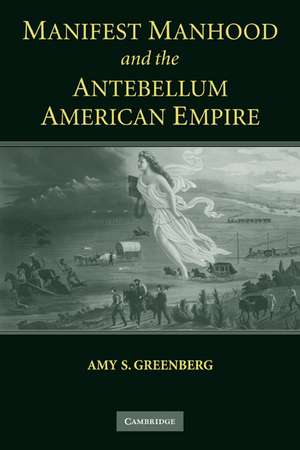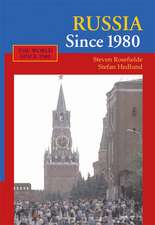Manifest Manhood and the Antebellum American Empire
Autor Amy S. Greenbergen Limba Engleză Paperback – 5 iun 2005
| Toate formatele și edițiile | Preț | Express |
|---|---|---|
| Paperback (1) | 203.42 lei 3-5 săpt. | |
| Cambridge University Press – 5 iun 2005 | 203.42 lei 3-5 săpt. | |
| Hardback (1) | 645.70 lei 6-8 săpt. | |
| Cambridge University Press – 5 iun 2005 | 645.70 lei 6-8 săpt. |
Preț: 203.42 lei
Nou
Puncte Express: 305
Preț estimativ în valută:
38.92€ • 40.76$ • 32.29£
38.92€ • 40.76$ • 32.29£
Carte disponibilă
Livrare economică 19 martie-02 aprilie
Preluare comenzi: 021 569.72.76
Specificații
ISBN-13: 9780521600804
ISBN-10: 0521600804
Pagini: 344
Ilustrații: 32 b/w illus.
Dimensiuni: 152 x 229 x 23 mm
Greutate: 0.54 kg
Ediția:New.
Editura: Cambridge University Press
Colecția Cambridge University Press
Locul publicării:New York, United States
ISBN-10: 0521600804
Pagini: 344
Ilustrații: 32 b/w illus.
Dimensiuni: 152 x 229 x 23 mm
Greutate: 0.54 kg
Ediția:New.
Editura: Cambridge University Press
Colecția Cambridge University Press
Locul publicării:New York, United States
Cuprins
Introduction; 1. The 'New Frontier' as safety valve: the political and social context of manifest destiny, 1800–60; 2. An American Central America: boosters, travelers, and the persistence of Manifest destiny; 3. American men abroad: sex and violence in the Latin American travelogue; 4. William Walker and the regeneration of martial manhood; 5. The irresistible pirate: Narciso López and the public meeting; 6. American womanhood abroad; 7. Manifest destiny and manly missionaries: expansionism in the Pacific; Conclusion: American manhood and war, 1860 to the present.
Recenzii
"Amy Greenberg's fascinating account casts new light on Manifest Destiny expansionism by showing how martial conceptions of manhood animated the enthusiasm for territorial annexation in the 1850s. Filibustering, she finds, stemmed not only from economic and political ambitions but from widespread male desires for adventure and romance. Although more restrained visions of manhood also influenced expansionist ambitions, particularly in Hawaii, Greenberg demonstrates that aggressive conceptions of manhood shaped foreign relations long before Theodore Roosevelt rallied the Rough Riders." -Kristin Hoganson, University of Illinois, Urbana-Champaign
"In this thoughtfully constructed and informative book, Greenberg develops a highly original thesis about American territorial expansionism and destroys the common wisdom that Manifest Destiny was in its death throes by the Civil War. Providing the most penetrating analysis, to date, of filibustering's ramifications for U.S. culture, Greenberg convincingly highlights the significance of gendered images, arguments, and ambitions within imperialist and anti-imperialist discourse alike. This book, in engaging prose richly informed by theory but refreshingly free of jargon, makes use of a treasure of source material, especially travel accounts and magazine pieces and convincingly illuminates hitherto unexplored connections between filibustering abroad and urban life at home, while also connecting U.S. military aggression against Latin America with America's imperial record in the Pacific. This is an insightful and provocative take on nineteenth-century American aggression overseas that has implications for the nation's modern plight abroad." -Robert May, Purdue University
"This work is a gender study of American expansionism during the period from 1848 to 1860." -Antonio Rafael de la Cova, The Register of the Kentucky Historical Society
"...a fine book that will be useful in many contexts." -Mark Jaede, Journal of the Early Republic
"In this thoughtfully constructed and informative book, Greenberg develops a highly original thesis about American territorial expansionism and destroys the common wisdom that Manifest Destiny was in its death throes by the Civil War. Providing the most penetrating analysis, to date, of filibustering's ramifications for U.S. culture, Greenberg convincingly highlights the significance of gendered images, arguments, and ambitions within imperialist and anti-imperialist discourse alike. This book, in engaging prose richly informed by theory but refreshingly free of jargon, makes use of a treasure of source material, especially travel accounts and magazine pieces and convincingly illuminates hitherto unexplored connections between filibustering abroad and urban life at home, while also connecting U.S. military aggression against Latin America with America's imperial record in the Pacific. This is an insightful and provocative take on nineteenth-century American aggression overseas that has implications for the nation's modern plight abroad." -Robert May, Purdue University
"This work is a gender study of American expansionism during the period from 1848 to 1860." -Antonio Rafael de la Cova, The Register of the Kentucky Historical Society
"...a fine book that will be useful in many contexts." -Mark Jaede, Journal of the Early Republic
Notă biografică
Descriere
This book documents the potency of Manifest destiny in the antebellum era.














